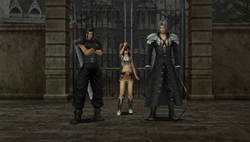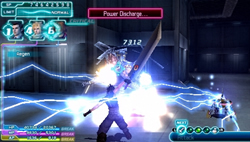Crisis Core is a prequel to Final Fantasy VII, chronicling the exploits of SOLIDER enlistee Zack. The core plot will still be largely enjoyable for any PSP owners looking for a quality role-playing game, but the finer details of the overall story will resonate only with players who finished the original game. The writing—especially in terms of character—is just as strong as it was so many years ago: prepare for some tear-jerking moments towards the end of the title.

First and foremost, the turn-based, textbook Japanese RPG stylings of the original have been ditched in favor of a fast-moving action system similar to that of Kingdom Hearts. Like Sora, Zack is the only controllable character in battle: the analog nub moves him around while a simple menu contains the various actions, which include using equipped materia and items.
The unifying element is a slot-reel system called the "Digital Mind Wave," or DMW. This quasi-random element affects both the playing out of battle and the way Zack evolves. Three reels, each with a number from 1-7 and various character portraits, are in constant motion during battle. When AP is used by performing attacks or rolls, one of the numbers stops; getting various combinations leads to various rewards. These rewards include temporary buffs, such as MP Cost Zero or AP Cost Zero, as well as limit breaks, level-ups, and more.
Though Zack is the only character that directly controllable, as mentioned, the DMW does brings other characters into play with character portraits. Each of the three reels has a character portrait attached, and lining up three of the same portraits will result in the summoning of the character in question. As you progress through the game, you can recruit support characters and summons which can be summoned with a little luck.
While the DMW is the most significant innovation in Crisis Core, it's also the game's biggest weakness. Simply put, the random element of the DMW makes battling a crapshoot. You're never quite sure when you're going to be able to hit a limit break or summon some aid. Worse yet, even leveling up is made random: you have to hit 7, 7, 7 on the reel to level up, and though its more likely to happen after you've fought a certain number of foes, it's still possible to play for quite a while past being due a level up without getting lucky. Thankfully, this element is largely ignorable; the game is pretty easy and for the most part the system will roll in your favor. It's just a shame that Square-Enix couldn't come up with anything more imaginative.

In fact, as a portable title Crisis Core is impressive. The load times are minimal, the graphics surpass those of the best PS2 games and rival those of God of War: Chains of Olympus, and there's a considerable amount of content crammed onto the modest UMD. With all the side missions, bonus content, grinding, character customization, and mini-games in addition to the main story, you can easily clock 25 hours with this game without batting an eye.
Crisis Core: Final Fantasy VII is a strong game, but it's certainly not the kind of definitive experience that its predecessor proved to be. It may stand on the shoulders of a giant, but it doesn't quite push the bar all that much higher; a fate which was perhaps inevitable. Nevertheless, Crisis Core is still a supremely polished, high-caliber RPG. The PSP has another great title to call its own.
Verdict: Buy
Developer: Square-Enix
Publisher: Square-Enix
Platform: PlayStation Portable
Price: $39.99
Rating: Teen
Other recent reviews:
reader comments